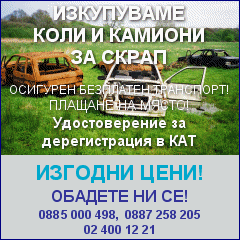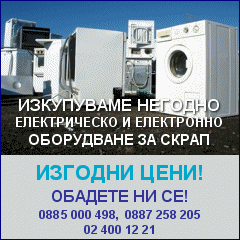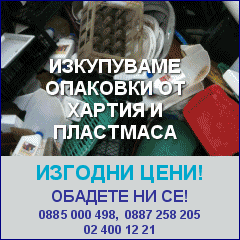Recycling, regardless of what material, it is important for nature as a whole. This process is complex - collection of used products, and their processing require the participation of each one of us. If we take care of all the waste from our everyday life to be recycled, we will live in a more beautiful and cleaner world.
The extraction and the use of natural resources in industry causes problems related to shortage of basic raw materials. The insufficiency of energy resources to meet the needs of mankind is also significant obstacle to human development. Scientists named this problem "raw, energy and environmental problem." One of the most significant ways to solve this problem is treating the waste. It involves the collection, storage, disposal, reuse, recycle, recovery and energy production from waste materials.
According to the type of processed material recycling is divided into several sections: ferrous and non-ferrous metal scraps, waste of glass, plastics, paper and also food and garden waste, so-called composting.
To ferrous metals belong steel and cast iron waste and debris. Requirements to waste to be produced in a form suitable for recycling with specific raw material properties are regulated by national standards, classifiers of metal exchanges, customs classifiers, specifications of processors. Conditions refer mainly to mixtures of a given metal.
Bulgarian steel producers have processed during the last year over 100,000 tons of scrap. The extracted in the country scrap is from shock absorbing fracture, from households and other sources.
Non-ferrous metals include 13 metals and their alloys, also composite metals such as lead, aluminum and others.
Requirements to waste and debris, as with ferrous metals are regulated by national standards, classifiers of metal exchanges, customs classifiers, specifications of processors are primarily concerned with mixtures of a given metal.
Combined by physical principle, chemical composition and varieties, the waste of non-ferrous metals have a different value as recycling product. But regardless of the value, all non-ferrous metals must be spared, as well as the other natural resources.
Yearly in the EU over 1,400 million tons of garbage is discarded. This makes more than 3,000 kg per person.
Recycling. Why is it necessary?
According to the type of treated material recycling is divided into several main groups: ferrous and non-ferrous metals, paper, glass and plastic. Here you can learn interesting facts about each of them.
Metals
Metals can be recycled indefinitely without losing its physical characteristics. The most recycled material in the world is steel. Steel is produced from iron ore. It is plentiful, but very often there is a large percentage of oxygen alloys, carbon, sulphur. World annual production of steel from iron ore exceeds 1.2 billion tons.
Recycling one ton of steel saves 1.5 tons of iron ore and 85% less harmful carbon emissions into the air. During recycling steel it is used about 75% less energy and 40% less water compared to production of steel from primary raw materials.
Here are some statistics:
- Yearly over 1.8bln. cans are produced ;
- Each household uses about 600 cans per year;
- About 300 million cans are used for one week during the Christmas period;
- The quantity of recycled steel packing is 47% and aluminum packing- 24%
The most recycled non-ferrous metal in the world is aluminum. It is obtained from bauxite - mellow ore rich in aluminum impurities. To remove these impurities and obtain pure aluminum a complex process is needed in which large amounts of electricity are consumed.
Recycling one kilogram aluminum saves 6 kg bauxite, 4 kg chemical products and 14 kWh. electric power. During recycling of aluminum cans it is used about 5% of the electricity needed to produce aluminum from primary products. Aluminum production in the world is about 28 million tons per year. The biggest aluminum producers are Australia, Brazil, Jamaica, China and parts of Europe.
Paper
Industrial paper production has a huge environmental impact. As it is well known, paper is made from wood pulp (cellulose) obtained from short-fibred hardwood (eucalyptus, poplar) or long-fibred softwood (pine, spruce). Currently around 90% of the cellulose is obtained from wood. Over 40% of all cut trees go for paper production. The main advantage of recycling is reduction the need of cutting such huge amount of trees. For example, in the Netherlands and Denmark recycled materials provide over 70% of the raw materials needed for paper production, in Germany this percentage is 76, in Japan - 54%. A number of estimates show that recycling 50% of the used paper in the world would save cutting about 84,000 sq. km forests. That's over 75% of the territory of Bulgaria.
Paper industry nowadays is growing. From ecological point of view the product is acceptable because it is liable to decomposition in nature, but should also highlight some downsides. Firstly the deforestation, which in turn leads to the extinction of various plant and animal species, following by soil destruction and erosion, decline in groundwater level, atmosphere pollution by substances emitted during the production. That is why paper recycling is so important for conservation of natural resources. According to research if half of the paper produced in the world is recycled, around 20 million acres forests will be preserved.
Paper recycling reduces the emissions of greenhouse gases. According to the U.S. Environmental Protection Agency (US EPA) recycling paper reduces by 35% water pollution and 74% air pollution.
Here are some facts
- One ton recycled paper saves 16 trees;
- Each tree produces enough oxygen for three people;
- Power consumption is reduced by 25 to 60 percent;
- One ton recycled paper saves the use of approximately 32,000 liters of water;
- 37% of Earth's garbage is paper;
- Recycling one ton paper saves about 4 MWh electric power – amount enough to supply one European household for entire year.
Glass
Glass material is part of the culture of mankind for over two thousand years. The process of recycling glass is complex - at first the recyclable material is crushed, and then by melting through vacuum, impurities are removed. The beauty of glass material is that practically it does not wear out and can be processed virtually forever. Since at least 25% of manufactured glass products in 2007 were created from recycled material the processing of glass is very important for thrifty usage of natural resources - one ton of recycled glass waste saves 530kwh. electric power, 300 kg. calcium soda, 200 kg fuel oil, 720 kg. quartz sand, 180 kg. calcium oxide.
For production of glass from cullets is necessary 30% less energy, than for its production from sand. With the energy saved by recycling of one glass bottle, your computer can work 25 minutes.



















